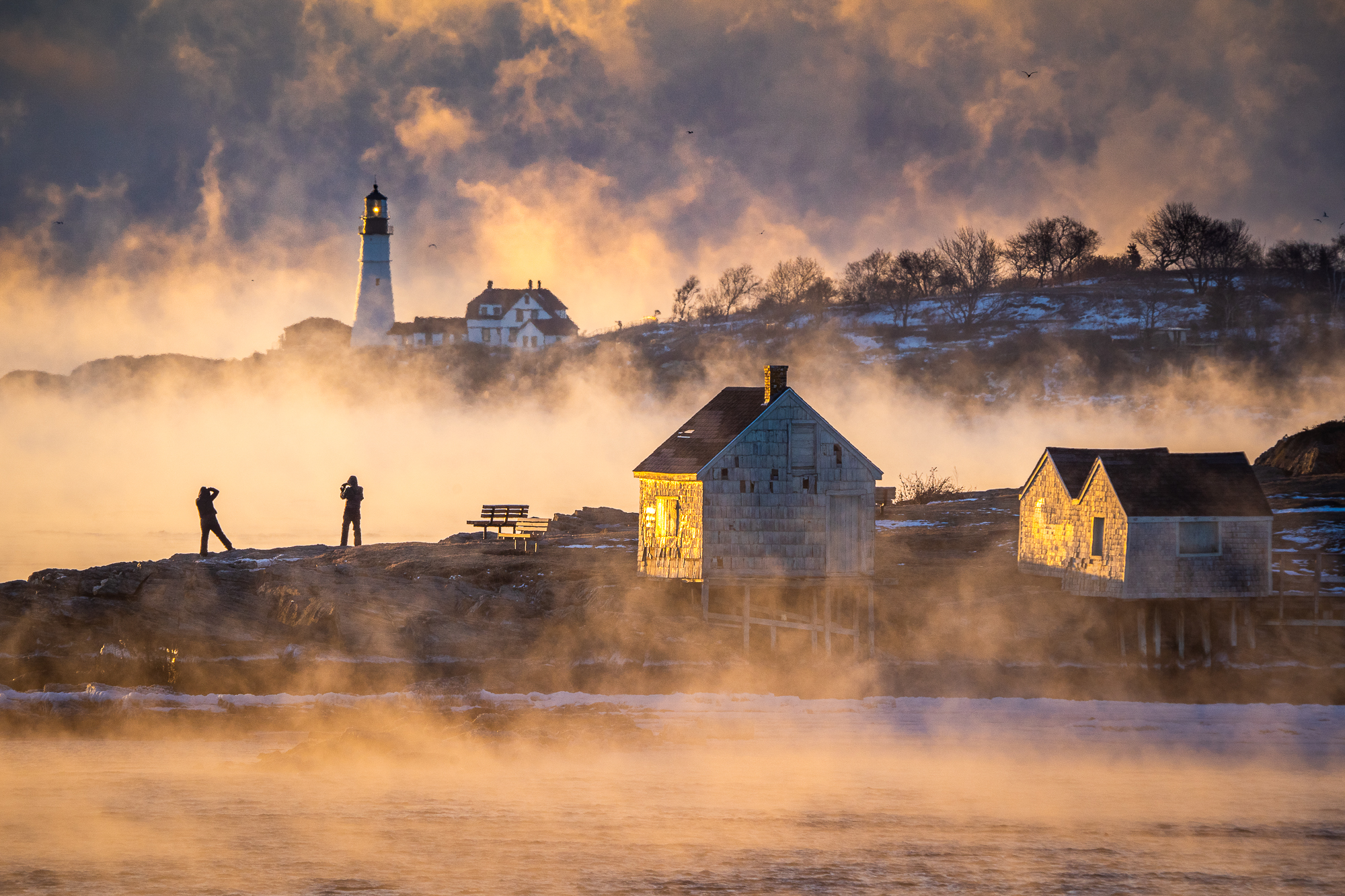The Daily Escape:

Sea smoke, South Portland, ME looking towards Portland Head light – February 2023 photo by Benjamin Williamson Photography
On Saturday, Wrongo and Ms. Right went to a dinner party with friends and two generations of family. The after dinner talk turned to how quite a few of the kids and grandkids weren’t planning on having children.
We tossed around ideas about why they were unlikely to procreate, and somethings stood out. First, they see climate change as an existential threat that society is unwilling to solve, even though the technology already exists. Why bring a kid into that?
Second, society seems broken. Our group meant that we face simultaneous crises, layered on top of each other. This situation involving simultaneous global challenges, for which we have few solutions, is called Polycrisis.
And a crisis in one global system can spill over into other global systems. They interact with each another so that each new crisis worsens the overall harm. The Polycrisis environment weakens every individual’s sense of security and their place in the world.
One impact that seems related to the simultaneous climate, health, economic and geopolitical challenges are the effects on children. The needs for special education and special services for the very young has never been greater in America. It’s forcing big changes in public school budgets across the country.
No one is really sure why this is happening.
Wrongo isn’t proposing a solution, just suggesting we need to think more about how the problems of declining birth rates, coupled with the growing issues our young children are facing, might be interrelated.
Noah Smith an economist, has an interesting newsletter about how we define community:
“In the past, our communities were primarily horizontal — they were simply the people we lived close to….Increasingly, though, new technology has enabled us to construct communities that I’ve decided to call vertical — groups of people united by identities, interests, and values rather than by physical proximity.”
Smith says that in the past few decades, Americans became disengaged from their local communities, hunkering down in their houses, and failing to interact with the people around them. That led to a well-documented decline in Americans’ participation in civic organizations, local clubs, etc. Our neighbors can also be stifling and/or repressive because they impose uncomfortable community norms on us.
We’ve always had Smith’s vertical communities: “the Jewish community”, “the LGBT community”, and many others. But in the past, an identity grouping wasn’t a true community. We all have identities that connect us with faraway people — other Irishmen, other Taylor Swift fans.
Prior to the internet, we couldn’t have much contact with them. These loose vertical communities weren’t efficient ways to exchange ideas. Before email, text and streaming video, getting the word out was very slow, and our horizontal communities would decide whether what we wanted to share was worthwhile.
Now, we’re no longer isolated. The internet brought us a world of human interaction: social media feeds, chat apps, and so on. Suddenly we’re surrounded by people through their words, their pictures, and their videos.
Now we organize much of our human interaction around virtual vertical communities. Former occasional connections became Facebook groups, subreddits and personal networks on Twitter. And like our small towns back in the day, vertical communities use social ostracism to punish those who deviate from consensus norms.
But vertical communities can’t provide things like public education, national defense, courts of law, property rights, product standards, and infrastructure that we all depend on.
These require a government to administer them. And governments are organized horizontally; mostly defined by lines on maps. But what if we socialize, cooperate, and fall in love with the people from our vertical community? What if we grow apart from the people next door and the relationship is irreparable?
We see this every day in America when citizens go to a PTA meeting and discover a bunch of strangers saying things that they despise.
Wrongo isn’t saying that vertical communities are another enemy. But they can and do exacerbate the polycrisis by making truth harder to see. And by making effective action more difficult.
If you doubt this, remember how powerful the anti-vaxx vertical was at the height of the Covid pandemic. Today’s vertical communities are strong enough to keep our government from getting much of anything done. How can we work together with neighbors when we share few common bonds?
America today is a predatory society. We predate on politics, ideas, values, and culture. Biden’s trying to change this, but can he succeed? How many of us are trying to help? Changing a society that’s this broken, one that’s moving deeper into vertical communities will be a very heavy lift.
Time to wake up America! What can we do to maintain what Lincoln in his first inaugural address said:
“We are not enemies, but friends. We must not be enemies. Though passion may have strained, it must not break our bonds of affection.”
To help you wake up, listen and watch the Nitty Gritty Dirt Band’s 2022 cover of Bob Dylan’s “I Shall Be Released” with Larkin Poe (Rebecca Lovell and Megan Lovell) on vocals and a fabulous slide guitar solo:
Sample of Lyrics:
Standing next to me in this lonely crowd
Is a man who swears he’s not to blame
All day long I hear him shout so loud
Just crying out that he was framed
